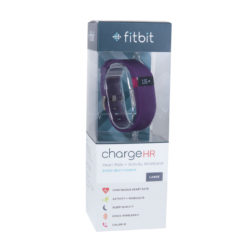Top Class Actions’s website and social media posts use affiliate links. If you make a purchase using such links, we may receive a commission, but it will not result in any additional charges to you. Please review our Affiliate Link Disclosure for more information.

Along with their motion to compel, Fitbit filed an opposition brief Monday, arguing the plaintiffs have failed to conduct discovery in a timely manner and the case should go to arbitration.
“Despite a year of litigation and multiple opportunities to come up with viable formation defense, they have not done so,” Fitbit charged.
Fitbit further states that the issue the plaintiffs are arguing has to do with allegations that their Fitbit fitness trackers do not work as advertised and they fail to sufficiently include issues with the arbitration clause.
“Plaintiffs insist they are challenging the underlying sale of the devices and they all allege they would not have bought them had they known of the alleged defect,” the Monday brief said. “Yet, plaintiffs do not allege any fraudulent inducement as to the arbitration clause itself. Their claim is that the devices do not work as advertised.”
Three Fitbit users, Kate McLellan, Teresa Black and David Urban alleged in their class action lawsuit filed in January 2016 that Fitbit’s fitness watches “do not and cannot consistently and accurately record wearers’ heart rates” during exercise.
McLellan said she compared her real-time heart rate readings from a Fitbit Charge HR with those on a stationary exercise machine and noticed a discrepancy. She called Fitbit and was told to reboot the device. That didn’t work, so she asked for a refund in an online chat with a company represented, but was denied.
The plaintiffs also allege Fitbit defrauded some consumers into waiving their class action and trial rights by not disclosing the existence of arbitration clauses to people who bought the wearable fitness trackers from third-party retailers.
Fitbit employs an arbitration clause included in its terms of service. Customers need to agree to the clause when they register on the company’s website and in order for the device to work.
However, the three plaintiffs all purchased their Fitbits at third party retailers.
“At no point before or during the purchase of [the] Charge HR was [the plaintiff] provided with or required to agree to an arbitration clause or class action ban, nor was [the plaintiff] put on notice that [he or she] would be required to agree to an arbitration clause or class action ban for [his or her] Charge HR to function as intended.”
In August, the plaintiffs’ argued for arbitration-related discovery on grounds that Fitbit devices don’t accurately monitor heart rate and should be heard in court, and not arbitrated, because of the company’s fraudulent sales practices.
They argued that the language of the clauses constitute an “unconscionable post-purchase agreement, which class members were required to accept in order to render operational” the Fitbits they purchased.
Additionally, in October the plaintiffs submitted a letter to U.S. District Judge James Donato which stated that Fitbit was withholding discovery documents and ignored their request to respond to discovery requests.
However, Fitbit countered Monday that the plaintiffs have had ample time to complete discovery but instead have delayed proceedings.
The plaintiffs are represented by Jonathan D. Selbin, Elizabeth J. Cabraser and Kevin R. Budner of Lieff Cabraser Heimann & Bernstein LLP, Robert Klonoff of Robert H. Klonoff LLC and Lori G. Feldman, Andrea Clisura and Courtney E. Maccarone of Levi & Korsinsky LLP.
The Fitbit Fitness Tracker Class Action Lawsuit is Kate McLellan, et al. v. Fitbit Inc., Case No. 3:16-cv-00036, in the U.S. District Court for the Northern District of California.
UPDATE: On June 5, 2018, a California federal judge has decided to allow the majority of claims in a class action lawsuit that alleges Fitbit devices cannot accurately read heart rates as advertised.
ATTORNEY ADVERTISING
Top Class Actions is a Proud Member of the American Bar Association
LEGAL INFORMATION IS NOT LEGAL ADVICE
Top Class Actions Legal Statement
©2008 – 2024 Top Class Actions® LLC
Various Trademarks held by their respective owners
This website is not intended for viewing or usage by European Union citizens.















5 thoughts onFitbit Pushes For Arbitration in Fitness Tracker Class Action Lawsuit
Please add me I have had several fit bits and I believe I have the receipts too.
Please add me
Please add me
Please add me
I was given a fit bit for Christmas and love it. It is accurate on the heart rate. I also use my pulse/oximeter device and both are coordinated on same readings. I never trust the heart rate monitor on the fitness machines at the gyms.